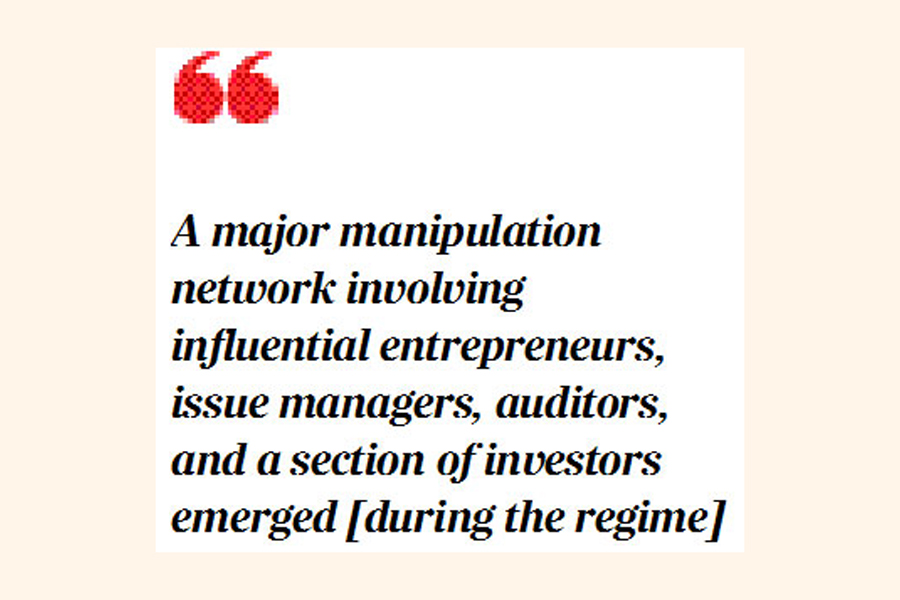Equity market controlled by influential frauds during Hasina's regime: White Paper

Published :
Updated :

Trillions of money was embezzled from the stock market through fraud, manipulation, placement shares, and IPOs, according to the final draft of White Paper on the state of the Bangladesh economy.
Powerful investors and institutions artificially inflated share prices through serial trading among themselves, violating securities laws.
They targeted some stocks and created false impressions of active trading in the shares to gauge out profits by offloading overvalued assets.
The report, published on Sunday, said the same group of influentials, who were behind the cracks in the banking sector, were also behind the stock market debacle.
An average of $16 billion had been siphoned off from Bangladesh every year during the Sheikh Hasina's regime, leaving the country in an economic crisis when she fled the country following a mass uprising, according to the report.
The report shed light on embezzlement of big chunks of money from several banks by a number of business conglomerates.
The committee that prepared the white paper submitted the report to Chief Adviser Professor Muhammad Yunus at his Tejgaon office on Sunday, saying they were horrified by the level of corruption, plunder, and statistical manipulation conducted by the Hasina's regime.
Debapriya Bhattacharya, a top economist and the distinguished fellow of the Dhaka-based think tank Centre for Policy Dialogue, headed the committee.
"A major manipulation network involving influential entrepreneurs, issue managers, auditors, and a section of investors emerged [during the regime]," reads the report.
The Bangladesh Securities and Exchange Commission (BSEC), tasked with the job of regulating the capital market, failed to play its role due to pressure from vested quarters, according to the report.
"Decisions pertaining to the initial public offering (IPO) and secondary market management, as taken by the commission, fall short of regulatory best practices. This has resulted in the erosion of investor confidence in the market."
The committee said foreign participation in the capital market was insignificant, primarily due to concerns over corrupt practices and a lack of transparency, especially regarding the availability of financial information of listed companies.
"This has resulted in the market being largely dominated by domestic investors."
Equity market growth is dragged by poor market infrastructure and unwieldy processing cycle for initial public offerings (IPOs).
"Current market systems are not supportive of a well-functioning market. IPO valuations give the sponsors an upper hand over the general investors in the secondary market," reads the report.
The book-building process is manipulated to the extent that it no longer effectively determines the true valuation of a company's shares.
Anomalies in IPO valuations (mostly under pricing) give the sponsors an upper hand over the general investors in the secondary market.
Stock market intermediaries suffered bankruptcy with a negative equity of Tk 130 billion. Of this, the merchant bankers accounted for Tk 70 billion and the brokerage houses accounted for Tk 60 billion.
Some big-ticket mutual funds were taken over by vested interest groups. Allegations of embezzlement of unit holders' funds had been made against top two institutions in the close-ended mutual fund sector, said the report without mentioning the names of the institutions.
The M Khairul Hossain-led commission in 2019 extended the duration of all close-ended mutual funds by 10 years ahead of the funds' maturity. That eroded investor confidence in the sector.
"The share markets have turned into a den of financial foul play. The company fundamentals are irrelevant to market valuations in ways very different from the bull and bear runs observed in developed stock markets."
Regulatory activity would kick in only when prices began to fall. The most controversial floor price system tarnished the market's reputation internationally.
The price restriction effectively halted trading in good companies while encouraging market manipulation, already incentivized by the disproportionately low fines relative to the expected profits from manipulation.
Low-performing or junk stocks showed up on the lists of top gainers or top turnovers. People rushed to buy them despite the high risk. The BSEC identified manipulators but they got away with insignificant fines.
As a result, those with ulterior motives were encouraged to use the flawed system to their advantage.
Weak and substandard companies entered the market through IPOs. Most of the listed firms are family-run businesses. Investors do not trust companies' financials, said the report.
To stop the free fall of market indices, the BSEC for the first time set the floor price of every stock in March 2020. Stock prices could not fall below that price level.
The restriction severely hurt the liquidity of the market as trading could not be done below the floor.
Meanwhile, price manipulation involving junk stocks and weak companies continued unabated.
Foreign portfolio investors shied away from the Bangladesh market for the regulatory intervention in the stocks' movement.
Excessive government tutelage held back market development and kept responsible institutions from carrying out their mandates.
This, combined with strong vested interests, resulted in an entrenched status quo of gambling and swindling. Laws, rules, and regulations were deliberately made deficient in curbing market manipulation.
In many cases, officials of the regulatory body themselves were involved in exploitation of legal loopholes, according to the report.
Public perception of the stock market is poor as manipulators face no legal action even after reports by investigation committees confirm their guilt.
One of the major impediments to private investment is the underdeveloped capital market, which limits access to finance.
The government should adopt a mechanism favourable for the capital market, ensuring transparency, investor protection, and institutional investment.
babulfexpress@gmail.com


 For all latest news, follow The Financial Express Google News channel.
For all latest news, follow The Financial Express Google News channel.